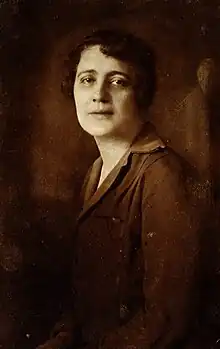Melitta Schmideberg | |
|---|---|
 Melitta Schmideberg c. 1925 | |
| Born | Melitta Rene Klein 17 January 1904 |
| Died | 10 February 1983 (aged 79) London, England |
| Education | |
| Occupations |
|
| Relatives | Melanie Klein (mother) |
| Medical career | |
| Institutions | British Psychoanalytical Society |
Melitta Rene Schmideberg-Klein (née Klein; 17 January 1904 – 10 February 1983) was a Slovakian-born British-American physician, psychiatrist, and psychoanalyst.
Biography
Schmideberg was born in Ružomberok, Austria-Hungary (now Slovakia) into a Jewish family, the only daughter and eldest child of Arthur Klein and psychoanalyst Melanie Klein (née Reizes). She had a brother, Hans, who was born in 1907. Prior to the First World War, the family moved to Budapest. Following the war, her father moved to Sweden and Melitta and her mother returned to Ružomberok, where Melitta graduated from high school in 1921.[1] She moved to Berlin to train at the Berlin Psychoanalytic Institute, where she met Austrian psychoanalyst Walter Schmideberg, a friend of Freud, whom she married in 1924.[1][2]
In 1927, Schmideberg earned her M.D. from Friedrich-Wilhelms-Universität in Berlin. That same year, her mother moved to London. Five years later, in response to rising anti-Semitism in Germany, Melitta and her husband joined her in London, where she became a British citizen.[1]
She moved to New York City in 1945 and helped found the Association for the Psychiatric Treatment of Offenders in New York.[1] She became a U.S. citizen in 1959, when she was living at 444 Central Park West.[3]
After her mother's death in 1960, she returned to London, where she died in 1983.[1][4]
Career
In London, she joined the British Psychoanalytical Society as associate member. Entering further analysis with Edward Glover,[5] she became a partisan with him in their vocal dispute with her own mother;[6] and later resigned from the Society in 1944[7] to concentrate on her work with juvenile delinquency.[2] She is sometimes seen as an extreme example of the bitterness that can be instilled by having an analytic parent.[8]
She was the founding editor of the International Journal of Offender Therapy and Comparative Criminology.[9]
Publications
Early articles
In the 1930s, Schmideberg published a series of articles in the International Journal of Psychoanalysis, on subjects ranging from the asocial child to intellectual inhibitions.[10]
Blitz studies
During The Blitz, Schmideberg published a set of observations on reactions to the air-raids in London, noting increases in localism, in drinking and (especially in women) sexual desire.[11]
Books
- Children in Need. Allen and Unwin. 1948.
- Short Analytic Therapy. Child Care Pub. 1950.
- Schmideberg, Melitta (1955). Principles of Treating Borderline Cases.
- Schmideberg, Melitta (1956). Multiple Origins and Functions of Guilt.
- My Experience of Psychotherapy. American Psychological Association. 1974.
- Probation and allied services: criminology in action - Volume 1. International Journal of Offender Therapy. 1971. with Gerhard O. W. Mueller, Irving Barnett.
See also
References
- 1 2 3 4 5 "Schmideberg-Klein, Melitta (1904-1983)". International Dictionary of Psychoanalysis. Retrieved 15 August 2018.
- 1 2 M. Shapira, The War Inside (2013) p. 148
- ↑ New York, Index to Petitions for Naturalization filed in New York City, 1792-1989
- ↑ Edward Bibring; Sanford Gifford (2005). Edward Bibring Photographs the Psychoanalysts of His Time: 1932 - 1938. Taylor & Francis. p. 203. ISBN 9783898064958.
- ↑ M. Shapira, The War Inside (2013) p. 57
- ↑ P. Gay, Freud (1989) p. 466
- ↑ Pearl King; Riccardo Steine. The Freud-Klein Controversies 1941-45. p. 17.
- ↑ J. Pearson, Analyst of the Imagination (2004) p. 49
- ↑ "Editorial Board". Sage Publishing. 28 October 2015. Retrieved 24 September 2017.
- ↑ Otto Fenichel, The Psychoanalytic Theory of Neurosis (1946) p. 652
- ↑ J. Gardiner, The Blitz (2011) p. 182-4